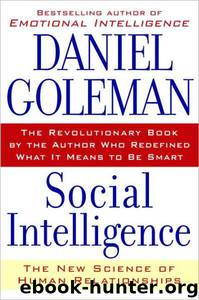Social Intelligence by Daniel Goleman

Author:Daniel Goleman
Language: eng
Format: mobi, epub
ISBN: 9780553803525
Publisher: Bantam Books
Published: 2006-09-01T10:00:00+00:00
THE LOW ROAD TO COMPASSION
Such empathy, Jaak Panksepp argues, has its roots in the low-road neural system for maternal nurturance, one we share with a wide range of other species. Empathy appears to be a primary response of this system. As every mother knows, her baby’s cry has particular potency. Lab studies show that a mother’s physiological arousal is distinctly stronger when she hears her own baby crying than when she hers another baby’s wails.7
The baby’s ability to elicit in his mother an emotion similar to what he’s feeling offers the mother guidance on what the baby needs. This ability of an infant’s cries to trigger on-target caregiving—a phenomenon seen not just in mammals but even in birds—suggests that it is a universal template in Nature, one with immense and rather obvious benefits for survival.
Empathy plays the pivotal role in caregiving, which after all centers on responding to the needs of others rather than our own. Compassion, a grand term, in its everyday guise can show as availability, sensitivity, or responsiveness—all signs of good parenting or friendship. And when it comes to a prospective mate, remember, both men and women rate kindness as the number-one trait they seek.
Freud noted a striking similarity in the physical intimacy between lovers and that between a mother and her baby. Lovers, like mothers and infants, spend much time gazing into each other’s eyes, cuddling, nuzzling, suckling, and kissing, with ample skin-to-skin contact. And in both cases the contact offers a contented bliss.
Sex aside, the neurochemical key to the pleasures of such contact is oxytocin, the molecule of motherly love. Oxytocin, which the human body releases in women during childbirth and nursing as well as during orgasm, chemically triggers the flood of loving feelings that every mother feels toward her baby—and so the primal biochemistry of protection and caregiving.
As a mother nurses, oxytocin floods through her body, producing many effects. It induces a flow of milk; it also dilates the blood vessels in the skin around the mammary gland, thereby warming her baby. The mother’s blood pressure falls as she feels more relaxed. Along with a sense of peacefulness, she feels more outgoing, wanting to engage with people—the more oxytocin she has, the more sociable she is.
Kerstin Uvnäs-Moberg, a Swedish neuroendocrinologist who has studied oxytocin extensively, contends that this chemical flood occurs whenever we engage in affectionate contact with someone we care for. The neural circuitry for oxytocin intersects with many low-road nodes of the social brain.8
The benefits of oxytocin seem to emerge in a variety of pleasant social interactions—especially caregiving in all its forms—where people exchange emotional energy; they can actually prime in each other the good feelings that this molecule bestows. Uvnäs-Moberg suggests that repeated exposures to the people with whom we feel the closest social bonds can condition the release of oxytocin, so that merely being in their presence, or even just thinking about them, may trigger in us a pleasant dose. Small wonder that cubicles in even the most soulless of offices are papered with photos of loved ones.
Download
This site does not store any files on its server. We only index and link to content provided by other sites. Please contact the content providers to delete copyright contents if any and email us, we'll remove relevant links or contents immediately.
The Art of Thinking Clearly by Rolf Dobelli(10489)
The 5 Love Languages: The Secret to Love That Lasts by Gary Chapman(9815)
Mindhunter: Inside the FBI's Elite Serial Crime Unit by John E. Douglas & Mark Olshaker(9343)
Becoming Supernatural by Dr. Joe Dispenza(8217)
Nudge - Improving Decisions about Health, Wealth, and Happiness by Thaler Sunstein(7707)
The Road Less Traveled by M. Scott Peck(7603)
Mastermind: How to Think Like Sherlock Holmes by Maria Konnikova(7347)
Enlightenment Now: The Case for Reason, Science, Humanism, and Progress by Steven Pinker(7313)
Win Bigly by Scott Adams(7198)
The Way of Zen by Alan W. Watts(6614)
Factfulness: Ten Reasons We're Wrong About the World – and Why Things Are Better Than You Think by Hans Rosling(4742)
The State of Affairs by Esther Perel(4721)
Gerald's Game by Stephen King(4654)
Man's Search for Meaning by Viktor Frankl(4606)
The Confidence Code by Katty Kay(4260)
Thinking in Bets by Annie Duke(4227)
The Healing Self by Deepak Chopra(3580)
Hidden Persuasion: 33 psychological influence techniques in advertising by Marc Andrews & Matthijs van Leeuwen & Rick van Baaren(3565)
The Worm at the Core by Sheldon Solomon(3487)
